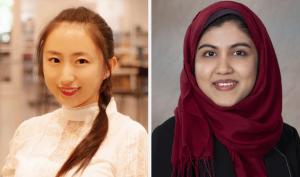According to the Society of Women engineers, only 17% of tenured or tenure-track faculty in engineering are women. Exposure to avenues for advancement are particularly important. The Rising Stars workshop gives aspiring faculty the opportunity to build a peer network and learn from established women faculty.
“This is great opportunity for Meiyi and Sarah,” said Lu Feng, an assistant professor with joint appointments in UVA Engineering’s departments of Computer Science and Engineering Systems and Environment and one of Ma’s advisors. Feng herself presented at the Rising Stars Workshop in 2015.
“I am thrilled that they were selected to present this year,” Feng said. “This opportunity provides them with helpful advice and recognition for their teaching and mentoring accomplishments.”
“We are very proud of Meiyi and Sarah,” said John A. Stankovic, BP America Professor of computer science and a faculty advisor for Ma and Preum. “They have been focused and diligent in their research, and they are also passionate about teaching. Being recognized as rising stars in the field of computer science is a testament to their talent, hard work, and early academic career success.”
Ma is a computer science Ph.D. candidate. Her research focuses on developing more robust models for safe, artificial intelligence-powered cyber-physical systems by integrating machine learning and formal methods.
She developed a new formal logic-based machine learning framework that teaches a deep neural network - the computer programming that simulates human-like decision-making in cyber-physical systems - to better assess future uncertainty. The research will contribute to improved performance of the cyber-physical systems that power a wide range of IoT applications used in everything from smart city systems to health care.
Ma credits the support she receives from Stankovic and Feng in her research success. Stankovic is director of UVA Engineering’s LINK LAB for cyber-physical systems, and Feng is a Link Lab faculty member who this year earned an NSF Career Award to develop more secure and trustworthy autonomous systems.
Ma is one of the more than 200 UVA Engineering graduate students – from the disciplines of civil engineering, computer engineering, computer science, electrical engineering, mechanical and aerospace engineering and systems engineering – collaborating with more than 40 faculty members in the Link Lab on cyber-physical systems research in the areas of autonomous systems, smart and connected health, smart cities and hardware for IoT.
“As a Ph.D. student in the Link Lab, I have a fantastic working environment and opportunities to discuss my research and collaborate with colleagues from both computer science and other departments in the School of Engineering,” Ma said.
Feng teamed Ma, a senior Ph.D. student, with junior Ph.D. students to help guide them in their cyber-physical systems research. Ma also mentored more than 10 undergraduate students on their capstone projects.
“Meiyi exhibits great potential as future faculty,” Feng said. “She is a good mentor to both undergraduate and graduate students. Not only does she excel in assigning tasks, she is adept at guiding students in the learning process.”
In 2021, Ma was also named a RISING STAR IN DATA SCIENCE by the Center for Data and Computing at the University of Chicago in recognition of her potential as an exceptional data scientist. She will join the Department of Electrical Engineering and Computer Science at Vanderbilt University as a tenure-track assistant professor in the Fall of 2021.
Preum received her Ph.D. in computer science from UVA Engineering in August 2020.
Preum’s research focuses on the pervasive cyber-physical systems used by both patients and health care providers in remote health monitoring, decision support and emergency response applications. Much more investigation of how these applications interact with humans is required to understand their full effects on health care. Preum uses modeling methods to observe how well the cyber-physical systems interact with humans, particularly in making suggestions for medical interventions. Her research will contribute to the development of systems that are more precise, safe and trustworthy.
Preum built a strong foundation in multidisciplinary collaboration working with peers and faculty from all areas of engineering in the Link Lab while completing her doctorate. She teamed up with researchers to develop a wearable cognitive assistant device aimed at helping emergency first responders. Preum presented the research at the 2020 National Institute of Standards and Technology Annual Public Safety Broadband Stakeholder Meeting.
“I was fortunate to work with a multidisciplinary, diverse team consisting of researchers and students from computer science and electrical and computer engineering, as well as real emergency responders, to create a health care solution that will solve a real-world problem,” she said. “I also appreciated the opportunity to mentor multiple graduate and undergraduate students. These mentoring and multidisciplinary research experiences enhanced my application for a faculty job search.”
Preum is completing her work as a postdoctoral fellow in the School of Computer Science at Carnegie Mellon University. She will join the Department of Computer Science at Dartmouth College as a tenure-track assistant professor in July 2021.
She plans to draw on her experience as a teaching assistant for the Introduction to Programming and Problem-solving course at UVA Engineering, where she focused on developing critical thinking skills through collaborative problem solving.
“Several students mentioned that they felt more confident in solving complex problems due to the time I spent with them in hands-on, guided interactions,” she said. “One of the most gratifying experiences at UVA was learning that several of my students chose computer science as a major after taking my course.”

